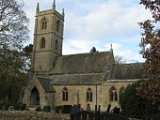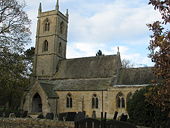
Newton, Lincolnshire
Encyclopedia
Newton is a historic hamlet
that dates back as a settlement to Roman
times and before, and is located around 13 km east of Grantham
. Newton is mostly contained in a conservation area and contains some listed buildings, although this has not stopped a large amount of development since the mid-1990s and the amount of habituated buildings has almost doubled with the current population being around 70 people today (2007) compared to around 30 people in the early 1980s, although the highest population recorded was 221 in 1846. Most of the surrounding land is owned by the Welby Estate and are farmed by the Sapperton Farming Company.
that was finished in 1086, (A bovate is 15 acers).
During this time It is estimated the population was 100 to 125 people.
Newton is also frequented by the S.L.A.G s (Sleaford Lafford Art Group).
 St Botolph Church is an example of an early English 14th and 15th century church although it stands on a site of an earlier church that is recorded as far back as the Domesday Book
St Botolph Church is an example of an early English 14th and 15th century church although it stands on a site of an earlier church that is recorded as far back as the Domesday Book
of 1087. The church was extensively restored in 1987 after the church had fallen into disrepair where also five bells were hung instead of the previous three.
Hamlet (place)
A hamlet is usually a rural settlement which is too small to be considered a village, though sometimes the word is used for a different sort of community. Historically, when a hamlet became large enough to justify building a church, it was then classified as a village...
that dates back as a settlement to Roman
Ancient Rome
Ancient Rome was a thriving civilization that grew on the Italian Peninsula as early as the 8th century BC. Located along the Mediterranean Sea and centered on the city of Rome, it expanded to one of the largest empires in the ancient world....
times and before, and is located around 13 km east of Grantham
Grantham
Grantham is a market town within the South Kesteven district of Lincolnshire, England. It bestrides the East Coast Main Line railway , the historic A1 main north-south road, and the River Witham. Grantham is located approximately south of the city of Lincoln, and approximately east of Nottingham...
. Newton is mostly contained in a conservation area and contains some listed buildings, although this has not stopped a large amount of development since the mid-1990s and the amount of habituated buildings has almost doubled with the current population being around 70 people today (2007) compared to around 30 people in the early 1980s, although the highest population recorded was 221 in 1846. Most of the surrounding land is owned by the Welby Estate and are farmed by the Sapperton Farming Company.
Newton
The following is the translation of the entry for Newton in the Domesday BookDomesday Book
Domesday Book , now held at The National Archives, Kew, Richmond upon Thames in South West London, is the record of the great survey of much of England and parts of Wales completed in 1086...
that was finished in 1086, (A bovate is 15 acers).
"M. In NEWTON Alsi had 7 bovates of land taxable, Land for 10 oxen, odo has 1 plough, 1 sokeman on 1 bovate of this land; 5 villieins & 4 borders with 1½ ploughs, A church; 12 acres (48,562.3 m²) meadow, woodland; pasture 70 acres (283,280.2 m²). Value before 1066 £4; now the same, Tallage 40 shillings."
During this time It is estimated the population was 100 to 125 people.
Newton is also frequented by the S.L.A.G s (Sleaford Lafford Art Group).
Local Businesses and Resources
- Church of England St Botolph church (With a service about every month).
- The Red Lion Public House (With daily lunchtime and evening service).
- Royal Mail Post Box.
- Newton Pottery (local studio pottery).
The Red Lion Public House
Partly a 17th century building and has probably been an alehouse since that time if not before.Woodruff Cottage
17th century house whose name is of the original family that occupied the house.The Old Farmhouse
Originally thatched and lower walls and was occupied from the Clark family from 1650 to 1810The Old Smithy
A blacksmiths operational to about 1920 and became ruined during the late 20th century and was demolished in 2002 and a modern stone building was built in it place.The School house
The school build in 1874 by the Welby family and closed in 1970. In 1945 the new education act removed children over 11 and bicycles had to be provided for the children to ride 3 miles (4.8 km) to the school in Osbournby school.Moat House
19th century house erected on the site of the ruins of an earlier hall and is named after the nearby moat which was the base of a windmill for a time then in the early 19th century replaced by a summerhouse with a Chinese bridge over the moat.The Old Post Office
A 17th century building originally owned by the Segrave family and is called the old post office because of a part of the house was a post office until about 1974.Newton House
Built in 1840 and extended in 1851, it was built for the eldest Welby son of the time. During the 1970s and 1980s the house was unoccupied and was bought and restored in the early 1990s.St Botolph Church

Domesday Book
Domesday Book , now held at The National Archives, Kew, Richmond upon Thames in South West London, is the record of the great survey of much of England and parts of Wales completed in 1086...
of 1087. The church was extensively restored in 1987 after the church had fallen into disrepair where also five bells were hung instead of the previous three.

